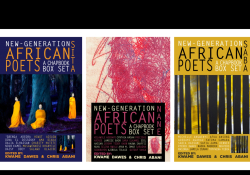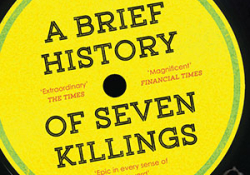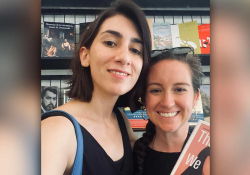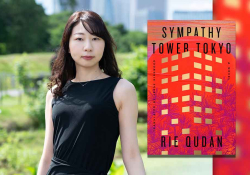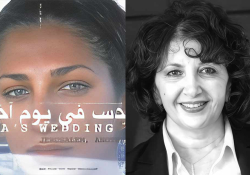In Colombia, Treading the Border between Memory and Magic: A Conversation with Ingrid Rojas Contreras

Days after a bicycle crash that would erase her memory for two months, Ingrid Rojas Contreras answered her phone and heard the voice of a woman she presumably didn’t know, but who sounded oddly familiar—her mother. Curiously, her mother had suffered a similar physical accident and extended memory loss decades earlier in Colombia and, as she recovered, began to see ghosts, empowering her to join a previously all-male family line of curanderos, or indigenous healers. This story, tinged with a García Márquez–like magical realism, lies along a border between fictional truth and documentable mystery that Rojas Contreras is now exploring in her memoir-in-progress, The Man Who Could Move Clouds, which centers on her curandero grandfather. Her 2018 novel Fruit of the Drunken Tree also treads that border, drawing on her family’s life in Bogotá against the backdrop of Colombia’s politically tumultuous 1980s and ’90s. In a December 2020 Zoom conversation, we compared how truth and fiction play together between memoir and novel.
Erik Gleibermann: I’m interested in your experience shifting from writing a novel that draws from your family’s lived experience in Colombia to writing a memoir that focuses on the actual experience of your family.
Ingrid Rojas Contreras: The material for Fruit of the Drunken Tree always felt like the first story I needed to tell, and I almost felt like without telling that story, I didn’t have space to tell others. It’s a very freeing process to take something that has happened in real life and have it go through some kind of transfiguration in fiction. It’s very clear for me what is real and what isn’t and what was a creative departure, and this became an interesting artistic investigation into my own writing process. I loved the play of taking something from reality and dragging it back to another landscape where anything can happen. Though it was fiction, I wanted it to feel like real life. So, I did a lot of political and historical research. I almost wanted it to be a hyperreal depiction of what the 1980s and ’90s were like in Colombia. Joyce Carol Oates calls fiction a mask that you can wear to approximate or get closer to a truth in a way that feels more confronting than in nonfiction.
Gleibermann: So, when you then go to memoir, does the mask come off? You don’t have that protection anymore, maybe?
Rojas Contreras: With fiction, I’m writing myself into situations where I will have to reveal an emotional truth, and with memoir, I am writing myself into corners where I have to confront looking at or saying something, whether there’s been silence or something ignored.
Gleibermann: Could you share something about the subject of the memoir? I understand it’s a family generational story.
Rojas Contreras: The Man Who Could Move Clouds is a family memoir and starts with my grandfather who was a curandero. People said he could move clouds, and he came from a line of healers who knew and practiced the same thing. He was supposed to initiate one of his sons. But he didn’t feel any of his sons had, in his language, the “testicles” to be a curandero.
The only person he felt could do it was my mom. In this lineage, women couldn’t be curanderas. It was said that if a woman became a healer, then misfortune would follow. Then my mom fell down an empty well and lost her memory for eight months. When she recovered her memory, she could see and hear ghosts. So, the family said she was meant for the lineage and it had just come directly to her from an accident.
When I was twenty-three, I had a bicycle accident: I crashed into a car and lost my memory for eight weeks. The family got really excited because they felt like the story was repeating. But they were disappointed in me because I didn’t come back with any supernatural ability. The story, then, is about what passes down and doesn’t pass down in three generations.
Then my mom fell down an empty well and lost her memory for eight months.
Gleibermann: You used the word hyperreal before. The way you describe what happened to your mother and what seems like a parallel experience for you, it almost feels like there’s a magical quality or a synchronicity. Is there a heightened element to the way you treat these stories?
Rojas Contreras: A lot of people have assumed Fruit of the Drunken Tree is the experience of my own life. We did see and go through some violence in Colombia, but our day-to-day reality was a lot different. I think throughout Latin America there is a different perception or sensitivity with your reality. Even in the day-to-day it seems there is more of a mix of realities where the borders between what is real and what traditionally isn’t are very mixed. In literature we see that tradition in magical realism. But that worldview has been in South America for a long time.
Gleibermann: So, in fiction it might be natural to play that boundary. Are you working with the blurring or the overlap of realities in the memoir, between the magical or the possible and the very concrete factual?
Rojas Contreras: The fun thing is I don’t have to play with it. I’m transcribing the reality as it’s presented to me. For example, one of the stories is that my mom could appear in two places at once, and I interviewed people who saw her appear across a room. My dad for some time was working overseas and kept seeing flashes of her doing housework. He’d turn around and she’d be cleaning the surface of something and then she’d be gone. It was just part of our day-to-day. In a Western worldview, people might freak out.
Gleibermann: A Western writer might try to investigate it, not just to tell the story, but to ask the question of what actually happened, with a skepticism, and to break it down.
Rojas Contreras: The investigation of or questioning of people’s realities is not what I’m interested in. And it is my reality. Another writer who grew up in the US might tell my dad to go see a doctor, and then they might document what the doctor said.
Gleibermann: It’s a family memoir, but it’s also your memoir as an individual, so as you describe your mother’s experience and because you use the word inheritance, what does it mean for you to be part of a line?
Rojas Contreras: When I lost my memory and started to recover it, the first time my mother called me, the phone screen said “Mami,” and I answered and didn’t know that I knew Spanish until she started to speak to me in Spanish. I didn’t know where I was from. I didn’t know anything. Day by day I would wake up and have a little more memory and my mother would retell stories to me of the family. There is a very strong oral tradition. Rather than reading books when I was little, my formative literary experience was listening to my mother’s stories. She would tell stories my grandfather told her, and at times she would dip into his language. For mestizo people in South America, the stories are not part of the official archive. In that sense, that is what I am calling an inheritance. And writing the book and being a writer is part of that.
Gleibermann: I’m wondering what it’s like to have grown up in Colombia, built a life in the US, and then be a family researcher, journeying back.
Rojas Contreras: When I go back, I am very aware of that distance in a particularly painful way. I step into where I left off. The people who have never left see me as I am, which is as an outsider now, as a gringa. I’m associated with “The Empire.” But I think it will never stop feeling for me like I am going back home. When I am in Colombia, I feel like I just become a truer version of myself. And when I speak Spanish, I feel like I am a truer version of myself. You are not really aware of what you lose until you are confronted with what you lost.
When I speak Spanish, I feel like I am a truer version of myself.
Gleibermann: Is writing in any way a recovery process? You can take that to mean two different things. This is a memoir, so in a literal sense recovering memories or information, but also writing a memoir can be a healing experience, recovery from loss, pain, separation, and trauma. I know your family has experienced trauma, if I can use that word, because of Colombia’s history in the period in which you grew up.
Rojas Contreras: One of the ways that my grandfather and my mother would heal is that sometimes when the ailment wasn’t physical, but was something someone was going through that affected their day-to-day, part of the healing process was listening to that person tell the story of what happened and casting the story back to them, but changing something so there was an exit out of the story.
When you’re going through something hard, there’s a way in which it becomes a cycle. You tread into the same thoughts and it loops back. Whatever’s making you suffer is making you tread in place. Even in the telling of the story something can change, even if nothing has changed. Your relationship to the past is different, and that makes it more possible to carry it. I think that’s what I was doing with my novel. I was changing my relationship to the past, and I’m doing the same with the memoir.
Gleibermann: So, you are your own curandera! I want to ask now about language. I’ve talked with various authors who have written fiction and also memoir in English whose native language is Spanish, or at times another language, and what I find is that the age at which you immigrate marks something about your relationship to your native language (WLT, May 2018). An author who comes somewhat earlier is more prone to losing a certain kind of contact with the Spanish compared to someone who comes later and is very rooted in the language.
Rojas Contreras: I came to the US when I was eighteen. I did go to bilingual school in Bogotá, and I was always very good in English. It felt like a much more clinical language to me than Spanish. Spanish for me has felt like a much more emotional language. I like the distance that English affords me. As I started to write, it felt like I could write in Spanish, but it felt more honest to write in English because I wanted there to be some kind of evidence for what my migration had been.
Gleibermann: You described in a Paris Review article that you were working in Spanish in the writing of the novel, thinking in Spanish and translating into English. How are the two languages functioning or interacting in the process of researching and writing the memoir?
Rojas Contreras: When I was writing the novel, I was thinking in Spanish and then doing an internal translation. I was doing a lot of experimentation with transliteration instead of translation. It’s a way to make the reader feel the way I feel living in two languages. With the memoir a lot of it also happens in Colombia, but the part of the story where I am thinking in the present tense of the story and musing on what these repeating stories mean is in English; I am not translating in my head. But when I am in the past and retelling a story that my mother told me, I am going through that translation process.
Gleibermann: Do we hear your grandfather’s voice in the memoir?
Rojas Contreras: Through my mother. Sometimes when she is storytelling, she will actually go into dialogue tags. She’ll say “he said” and “I said.”
Gleibermann: The experience of language you describe for your English-speaking reader of the novel is of alienation, picking up on what doesn’t translate, like the title itself, which doesn’t make sense because it’s a transliteration of a single word (borrachero) for a particular kind of tree. Are you doing that in the memoir, transliterating the voice of your grandfather as told through the voice of your mother?
Rojas Contreras: Yes. I have such a reverence for the way language carries cultural thinking. A saying I particularly love is más rápido que el pedo de una bruja. It would just be murdering it to not say “quicker than a witch’s fart.” It’s so delicious and so funny.
I have such a reverence for the way language carries cultural thinking.
Gleibermann: You are making translations of words, but you are also talking about cultural phenomena that maybe don’t translate. I think of curanderismo. How do you talk about that in English when there are elements that are not translatable, like a blurring of real and magical qualities?
Rojas Contreras: I know there will be a gaze into the writing, someone saying, “Yeah, but did that really happen?” I try to ignore that gaze. If I can just drop the reader into the world instead of trying to explain it, then the writing and the story flow more naturally. If I privilege the gaze more, the story just kind of stops. The interaction would become defensive.
Gleibermann: With your research, you are working with documents. When I went back through the novel, I noticed the subject of documentation. It begins and ends with a photograph and also a letter. There’s a lot of media, like Chula learning about what is going on through the television or secondary sources. What is the importance of documentation in an oral storytelling piece of work?
Rojas Contreras: When I was working on the novel, I was aware that there was a mainstream story that you would see on the news and a story that did not make it into the news as much. Part of the research was looking at newspapers, seeing documentaries and news reports. The other part was talking to people. I interviewed former guerrilla members about what that was like and why they joined. In a novel you can make the reality as complicated as possible.
But with the memoir, there weren’t monks during colonial times who said let’s write a book about curanderismo. In a lot of ways the record is oral storytelling. It’s been strange to go from one experience where I feel like I can find whatever I want because I know where to look and the other experience with the memoir, where my only option is to talk to people and these stories feel very airy, where the porousness between reality and fiction is very much alive. I did start to take Polaroid photos, and that will be part of the memoir. I’ve been interested in creating my own visual record.
Gleibermann: It’s interesting to include photos in what is largely an oral story.
Rojas Contreras: I wanted visual reminders for the reader to say, “Oh yeah, this is real. This is a real place and this is a real person that she talked to.” I wanted to alienate the reader again a little bit from what they think they’re experiencing.
December 2020

Ingrid Rojas Contreras is the author of Fruit of the Drunken Tree (Doubleday, 2018), a silver medal winner in First Fiction from the California Book Awards and a New York Times editor’s choice. Her latest work, The Man Who Could Move Clouds, is forthcoming from Doubleday in spring 2022.





